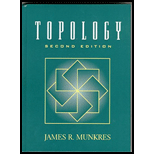
Concept explainers
(a) The formula
is not one to which the principle of recursive definition applies. Show that nevertheless there does exist a function
(b) Show that the formula
(c) Show that there is no function
Want to see the full answer?
Check out a sample textbook solution
Chapter 1 Solutions
Topology
- find h(1) = 1 + h(-1), h(2), h(+), h(x – 1), harrow_forwardFind a general formula for f("). f(x) = (x + 6)- (Use symbolic notation and fractions where needed.) f(M(x) =arrow_forwardSuppose f(x) = vx – 3 and g(x) = x² + 5. Which of the following is a formula for fo g)(x)? Suppose f(x) = x2 + 3 and g(x) = x – 2. Which of the following is a formula for f - g)(x)?arrow_forward
- If f(x) = 4x² − x + 3, find the following.arrow_forwardIf h ( x ) = 3 x 2 − 2 x, then find h (5).arrow_forwardIf h(x) = 2. 2x and g(x) = x², find h(g(x)). Do not simplify. O h(g(x)) = 2æx? Oh(g(x)) = h(2æ²) h(2a²) Oh(g(a)) = 2x(a) O h(g(x)) = 2² Oh(g(x)) = (2x)? Question Help: DVideo Calculator Submit Questionarrow_forward
- 2. Let f(x) = -x + 7 and g(x)=x²-2. Evaluate each expression. (a) f(g(1)) (b) g(f(6))arrow_forwardComposition and Inverses of Functions Suppose f(x) = 2x, g(x) following. = 3x - 2, and h(x) = x2 %3Darrow_forwardEvaluate each of the following expressions using the given table of values. -3 -2 -1 0 -1 -3 1 0 -1 X f(x) g(x) (a) f(g(-2)) (a) f(g(-2))= (b) g(f(-1))= (c) f(f(-2)) = (d) g(g(1)) = (b) g(f(-1)) 0 0 -3 (c) f(f(-2)) 1 1 -1 (d) g(g(1)) Timearrow_forward
- Suppose that j(x) = h-¹(x) and that both j and h are defined for all values of x. Let h(6) = 4 and j(9) = -3. Evaluate if possible and enter the value of the expression in the blank. If you do not have enough given information to evaluate the expression, enter unknown in the blank beside the expression. (a) h(j(6)) = (b) j(h(6)) = (c) h-¹(-3) = (d) j(6) = (e) h(9) = (f) j-¹(-3) = (g) j(4) = (h) (h(4))-¹ = (i) (h(-3))-¹ =arrow_forward(9) Let X b(n,- and E(3x) = E(3-5x) find n.arrow_forwardSuppose f(x) = x 2 +3 and g(x) x - 2. Which of the following is a formula for (f - g)(x)? O (f -g) (x) = x 3 + 2x 2 + 3x - 2 O (f - g) (x) = x 2 -x + 5 O (f - g) (x) = x 2 - 4x +7 O (f - g) (x) = x 2 -x +1arrow_forward
- Algebra & Trigonometry with Analytic GeometryAlgebraISBN:9781133382119Author:SwokowskiPublisher:Cengage
